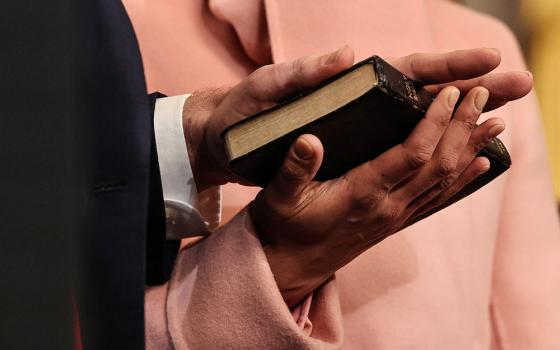
It has been almost 40 years since the landmark Roe v. Wade decision took the issue of abortion out of state legislatures, where it was being debated in many states, and established a constitutional right to the procedure. The decision short-circuited the messy, cumbersome, noisy way we Americans make laws and cast the debate in absolute terms. Pro-choice advocates insisted that women had an absolute right to an abortion. Pro-life forces insisted the unborn child had an absolute right to life. The ambivalence most Americans felt about abortion -- and about the pre-Roe legal regime that left many women dead or maimed from illegal abortions -- got lost amid the claims of absolutists.
To be sure, this ambivalence has manifested itself at times in the years since Roe most obviously in the passing of the Hyde Amendment, which barred the use of federal funds for abortion from all government-provided health care programs such as Medicaid and from the federal employees’ health benefits package. The current debate over the role of abortion funding in health care reform reflects this ambivalence also. But, mostly, pro-life advocates have been unable to shake the legal structure of Roe, which effectively guarantees abortion on demand.
It is time to rethink pro-life strategy, and that rethinking must include new arguments aimed at persuading our fellow citizens, a new political and cultural approach to abortion itself, and finally a new ecclesiological awareness that will stop the very American, and very un-Catholic, habit of reducing religion to ethics.
A new argument
Catholics, including the hierarchy, need to find a new way to talk about abortion. The words and phrases we use have become entirely loaded, with meanings that are often unhelpful or outdated or both. Rhetoric matters, not only because it is the vehicle for persuasion in a democratic society, but because it helps us explain ourselves to others (and sometimes to ourselves). We use rhetoric not only to describe reality, but our rhetoric shapes our reality, especially our human reality where we make value judgments and wrestle with existential questions.
Chicago Cardinal Joseph Bernardin tried to place Catholic concern about abortion in a “seamless garment” of life issues. This approach had the value of presenting Catholic teaching on a range of issues integrally, like the seamless garment of Christ, a reference Bernardin clearly intended. The seamless garment construction had the disadvantage of making abortion appear as one among many issues, all of them more or less of equal import. This was not Bernardin’s intention, certainly, but in American politics in the 1970s, the reign of interest groups was still prevalent: Politics was a smorgasbord and no politician was expected to take one of everything. Catholic politicians, especially progressive Democrats, found it easy to say, “Well, I don’t agree with the church on this one issue, but I agree with the church on many other issues.” The seamless garment fit the political temper of the time. Bernardin’s intention to make Catholics see how all these issues were related was lost as politicians used it self-servingly to keep their Catholic credentials while voting against any effective measures to limit the scope of abortion rights.
Some conservative Catholics disparaged the Bernardin approach because it appeared to them to level all moral issues, failing to distinguish between those that were never permissible, like abortion, and those, like economic matters, on which there is a variety of Catholic positions. This position received its most famous, and most noxious, formulation in 2004 when the conservative group Catholic Answers published a voting guide listing what they considered the five “nonnegotiable” political items for a “serious Catholic.” The list, conveniently enough, tracked with positions held by the GOP: abortion, euthanasia, embryonic stem cell research, same-sex marriage and human cloning. The partisan nature of these items was only part of the problem. The bigger difficulty is that while the moral case against abortion may be an obvious one, it is less clear what political consequences flow from that moral case. Are Catholics to insist that, in this pluralistic society of ours, abortion be criminalized? Would women go to jail or just the doctors? And, the lack of any mention of pre- or post-natal health care for women on the “nonnegotiable” list demonstrated that the orthodoxy to which Catholic Answers pays homage is a Republican orthodoxy.
The pro-life movement needs to argue that abortion is a foundational moral issue, both in terms of Catholic moral theology and in terms of any reasonable configuration of human rights. If a part of a house’s foundation is missing, the whole thing can come tumbling down and, indeed, Catholic politicians who are motivated by the church’s social justice tradition but who fail to extend their concern to the unborn can be tagged with hypocrisy. On the other hand, no one can live in a foundation. You live in the beautiful house, with its many rooms, on top of the foundation. Indeed, you barely even see the foundation unless you are looking for it. It is there, and it must be firm, but it is what the foundation supports that catches the eye. The pro-life movement can no longer ignore the house, no longer protest against abortion without also protesting on behalf of prenatal care, job security for pregnant women, health insurance to cover the costs of a pregnancy, and a myriad other issues that are consonant with the church’s social tradition.
A new politico-cultural approach
It is difficult to see what the pro-life GOP crowd has accomplished. Every Jan. 22, on the anniversary of the Roe decision, there is a march in Washington. If there is a Republican in the White House, they speak to the rally -- by telephone. You can see the marchers from the windows of the Oval Office, but all the pro-life crowd has been able to achieve is, literally, lip service.
 Poll after poll shows that Americans do not want to return to the pre-Roe days of back-alley abortions, even while more and more Americans identify themselves as “pro-life.” The one way to make more and more Americans identify as “pro-choice” would be to overturn Roe. Indeed, there is now a symbiotic relationship between the organized pro-choice and pro-life groups. They need each other. The most recent, and somewhat comic, example of this was the pro-life movement’s use of the Freedom of Choice Act as a fundraising scare tactic last year. The act, which never stood a chance at passing and was not even introduced in the current Congress, got its start as a fundraising device for pro-choice groups in the early 1980s. What goes around comes around.
Poll after poll shows that Americans do not want to return to the pre-Roe days of back-alley abortions, even while more and more Americans identify themselves as “pro-life.” The one way to make more and more Americans identify as “pro-choice” would be to overturn Roe. Indeed, there is now a symbiotic relationship between the organized pro-choice and pro-life groups. They need each other. The most recent, and somewhat comic, example of this was the pro-life movement’s use of the Freedom of Choice Act as a fundraising scare tactic last year. The act, which never stood a chance at passing and was not even introduced in the current Congress, got its start as a fundraising device for pro-choice groups in the early 1980s. What goes around comes around.
The inability of the church to change the attitudes of fellow citizens about abortion has been a source of great frustration to the bishops. Some have decided to lash out and to up the ante, declaring who should and should not present themselves for Communion, as if the Eucharist were a kind of reward for a good voting record. In America, Pelagianism remains the most popular heresy, even among the higher clergy. But disappointment can never be allowed to frustrate faith, as St. Francis of Assisi showed when he failed to convert the Sultan or receive the crown of martyrdom for his effort. In the face of disappointment, we are called to deepen our faith. Additionally, when these neo-Pelagian prelates strike out at politicians, they tend to do so clumsily, without appreciating the difference between opposing abortion and deciding that laws are the best way to express that opposition in a pluralistic polity. Their efforts are counterproductive.
The pro-life movement needs to abandon the effort to overturn Roe. Not because Roe is good law -- it isn’t -- but because a change in the law can only come about after a long period of cultural change. Instead of threatening Catholic politicians who fear offending powerful pro-choice interest groups, bishops could meet with them and ask them and their families to volunteer once a month at Project Rachel, counseling women who feel remorse for having procured an abortion. Or they could volunteer at a crisis pregnancy center once a month. The bishop could ask the politician to come back, with his or her family, after six months of such volunteering and discuss the issue again.
The Catholic church is the most organized of organized religions. Progressive Catholics know the price of that organization all too well: Affecting change within the church is a slow, glacial process. But that organization also allows the church to accomplish things less organized churches can’t, and the Catholic church should turn every one of its parishes into a crisis pregnancy center. We need to put our money, our time, our resources, our hospitals, our schools and our families where our pro-life mouth is. “Preach the Gospel,” said Francis. “If necessary use words.” We need to not use words for a generation and then see where both the church and the culture are on the pro-life issue. My guess is that we can achieve more by witnessing to our belief in the sanctity of human life, and let the law take care of itself for 20 years.
A new ecclesial awareness
“It is a great temptation for the church to reduce its mission to that of an ethical authority in order to gain access to the public forum,” Msgr. Lorenzo Albacete wrote in the journal Communio 15 years ago. The temptation has not ceased in the interim. Indeed, Pope Benedict XVI has warned again and again that moralism can stand in the way of evangelization, most obviously in his book Jesus of Nazareth, where he comments on the parable of the Pharisee and the tax collector at prayer, found in Luke 18:9-14. The pope writes: “Ethics is not denied; it is freed from the constraints of moralism and set in the context of a relationship of love -- of relationship to God.”
The creed does not mention any moral precepts. The Eucharist, not the Code of Canon Law, is the source and summit of Catholic life. Yet, if you only knew about Catholicism what you had seen on television lately, you would think the only thing that really concerns the church is what its members do with their private parts. The latent Jansenism of American Catholicism, combined with the moralism of the mainstream culture, robbed Catholicism in the United States of the kinds of cultural expressions of faith one finds in Catholic countries.
This must change. The issue is not only that an imposed moralism, even if its morality is upstanding, does not befit the freedom of the children of God, a freedom that requires all morality to be freely chosen not imposed externally. The issue is how we see and understand ourselves and present ourselves as Catholics. If some conservative writers (and bishops) are to be believed, to be a true Catholic means you support every plank of the Republican Party platform. It would be equally wrong to believe that supporting every item of the Democratic platform would gain one heaven. To be a Christian and a Catholic means that the most important event in your life happened on a hillside in Jerusalem 2,000 years ago and that you are sincerely, with an open heart, dedicated to teasing out the meaning of those long ago events in your life. The church today needs fewer press releases on abortion and more catechesis about the astounding, dogmatic claims made about the man Jesus. Apart from the central mysteries of our faith, our moral teachings are nonsensical.
Law is sometimes a blunt instrument, and the focus of the pro-life movement on changing the laws regarding abortion have demonstrably failed to accomplish anything. It is time to rethink how we talk about abortion, how we address the concrete needs of women facing crisis pregnancies, and how, as a church, we articulate our moral vision. Otherwise, we will keep banging our heads against the wall and that does not do anything for the unborn.
[Michael Sean Winters is a regular NCR contributor.]
| Special Coverage for the National March for Life
To mark the 37th annual March for Life in Washington, NCR has prepared a series of articles that will appear on our Web site Jan. 21 and Jan. 22.
|



